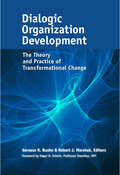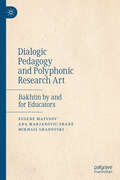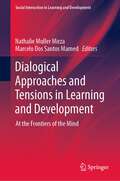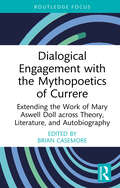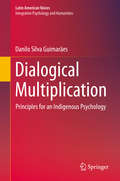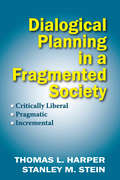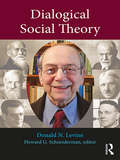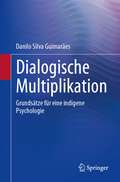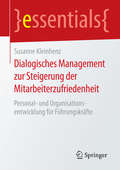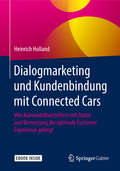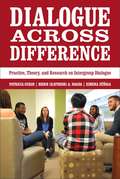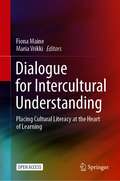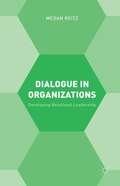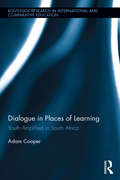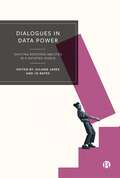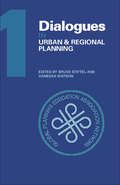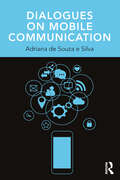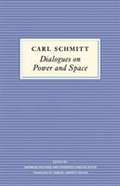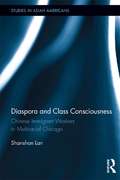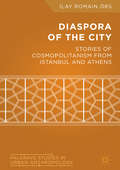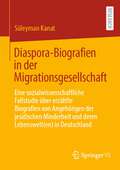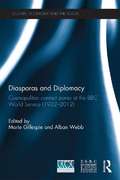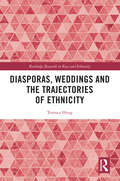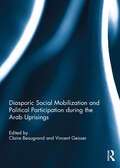- Table View
- List View
Dialogic Organization Development: The Theory and Practice of Transformational Change
by Robert J. Marshak Gervase R. BusheA Dynamic New Approach to Organizational ChangeDialogic Organization Development is a compelling alternative to the classical action research approach to planned change. Organizations are seen as fluid, socially constructed realities that are continuously created through conversations and images. Leaders and consultants can help foster change by encouraging disruptions to taken-for-granted ways of thinking and acting and the use of generative images to stimulate new organizational conversations and narratives. This book offers the first comprehensive introduction to Dialogic Organization Development with chapters by a global team of leading scholar-practitioners addressing both theoretical foundations and specific practices.
Dialogic Pedagogy and Polyphonic Research Art: Bakhtin by and for Educators
by Ana Marjanovic-Shane Eugene Matusov Mikhail GradovskiThis book presents voices of educators describing their pedagogical practices inspired by the ethical ontological dialogism of Mikhail M. Bakhtin. It is a book of educational practitioners, by educational practitioners, and primarily for educational practitioners. The authors provide a dialogic analysis of teaching events in Bakhtin-inspired classrooms and emerging issues, including: prevailing educational relationships of power, desires to create a so-called educational vortex in which all students can experience ontological engagement, and struggles of innovative pedagogy in conventional educational institutions. Matusov, Marjanovic-Shane, and Gradovski define a dialogic research art, in which the original pedagogical dialogues are approached through continuing dialogues about the original issues, and where the researchers enter into them with their mind and heart.
Dialogic Pedagogy and Polyphonic Research Art: Bakhtin by and for Educators
by Ana Marjanovic-Shane Eugene Matusov Mikhail GradovskiThis book presents voices of educators describing their pedagogical practices inspired by the ethical ontological dialogism of Mikhail M. Bakhtin. It is a book of educational practitioners, by educational practitioners, and primarily for educational practitioners. The authors provide a dialogic analysis of teaching events in Bakhtin-inspired classrooms and emerging issues, including: prevailing educational relationships of power, desires to create a so-called educational vortex in which all students can experience ontological engagement, and struggles of innovative pedagogy in conventional educational institutions. Matusov, Marjanovic-Shane, and Gradovski define a dialogic research art, in which the original pedagogical dialogues are approached through continuing dialogues about the original issues, and where the researchers enter into them with their mind and heart.
Dialogical Approaches and Tensions in Learning and Development: At the Frontiers of the Mind (Social Interaction in Learning and Development)
by Nathalie Muller Mirza Marcelo Dos Santos MamedThe book pursues the goal of exploring and strengthening a dialogical approach of communication and cognition. It brings together contributions from world-leading researchers related to the dialogical approach in education and psychology. It presents, among others, the place of language and materiality in the development of communication and thinking, as well as the role of the methods in the relationship between researchers and participants. This leads to an innovative definition of the dialogicality and how a dialogical approach can provide heuristic (conceptual and methodological) tools to better understand how people think, communicate and learn in a complex world.The authors hereby develop an epistemological framework inspired by scholars such as Michaïl Bakhtin, Lev Vygotsky and Herbert Mead under the assumption that dialogue, or dialogicality - and therefore the presence of the other – is fundamentally entangled into the human thinking and development.This book contributes to the understanding of human communication, cognition and mind, and participates in a scientific dialogue which helps to advance future research. It includes theoretical and empirical chapters and presents innovative methods of inquiry, which makes it a useful tool for both teaching and research.
Dialogical Engagement with the Mythopoetics of Currere: Extending the Work of Mary Aswell Doll across Theory, Literature, and Autobiography (Studies in Curriculum Theory Series)
by Brian CasemoreThis volume showcases a series of chapters that elaborate on Mary Aswell Doll’s contributions to the field of curriculum theory through her examination of currere as a mythopoetics. By bringing Doll’s Jungian, autobiographical, and literary perspectives into conversation with emergent forms of subjective inquiry—including aesthetic concepts, ecological questions, and spiritual themes—the volume foregrounds the originality and significance of Doll’s book The Mythopoetics of Currere in particular, while simultaneously extending it and demonstrating its applications in various scholarly conversations. Leading scholars in the field of curriculum studies such as William F. Pinar and Molly Quinn demonstrate how they use Doll’s ideas as pedagogy, as theoretical framing for their work, and as the basis of their own study and self-exploration. A response essay from Doll herself concludes the text, bringing further thought and insight to the mythopoetic dimensions of currere. This text will benefit scholars, academics, and students in the fields of curriculum studies, curriculum theory, and the foundations of education more broadly. Teachers and teacher educators interested in the conceptualization of curriculum in humanities education will also benefit from this volume.
Dialogical Multiplication: Principles for an Indigenous Psychology (Latin American Voices)
by Danilo Silva GuimarãesThis book presents a theoretical framework developed to support psychologists working with indigenous people and interethnic communities. Departing from the cultural shock experienced as a psychologist working with indigenous people in Brazil, Dr. Danilo Silva Guimarães identifies the limits of traditional psychological knowledge to deal with populations who don’t share the same ethos of the European societies who gave birth to psychology as a modern science and proposes a new approach to go beyond the epistemological project that aimed to construct a subject able to represent the world free from any cultural mediation. According to the author, the purpose of cultural psychology is to produce general psychological theories about the cultural mediation of the self, others and world relationships. Based on this assumption, he argues that to achieve this aim, cultural psychology needs to understand how indigenous perspectives participate in the process of knowledge construction, transforming psychological conceptions and practices. In this volume, the author presents his own contribution to open cultural psychology to indigenous perspectives by discussing the theoretical and practical implications of the notion of dialogical multiplication for the construction of work in co-authorship in the relation between psychology and indigenous peoples. With the growing migrations around the world, competences in psychological communication across cultures are more demanded each day, which makes Dialogical Multiplication – Principles for an Indigenous Psychology a critical resource for psychologists working with interethnic and intercultural communities around the world.
Dialogical Planning in a Fragmented Society: Critically Liberal, Pragmatic, Incremental
by Thomas L. Harper Stanley SteinThe culmination of a critical study of neo-pragmatism philosophy and its application to planning, Dialogical Planning in a Fragmented Society begins with philosopher Stanley M. Stein's examination of neo-pragmatism and his thoughts on how it can be useful in the field of environmental design-specifically, how it can be applied to planning procedures and problems. Neo-pragmatism is an approach that has been, in the past, best expressed or implied in the writing of Hilary Putnam, Richard Rorty, and, in particular, Donald Davidson, John Rawls, and Ludwig Wittgenstein. Thomas L. Harper furthers this tradition by providing the context for this theoretical application from his academic background in economics and management as well as his practical experience with political decision-making processes, community planning, and economic development. The result is a fresh synthesis of ideas-a new approach to thinking about planning theory and its implications for, and relationship with, practice. Philosopher Michael Walzer has asserted that "philosophy reflects and articulates the political culture of its time, and politics presents and enacts the arguments of philosophy." Similarly, the authors view planning theory as planning reflected upon in tranquility, away from the tumult of battle, and planning practice as planning theory acted out in the confusion of the trenches. Each changes the other in a dynamic way, and the authors demonstrate the intimate and inextricable link between them.
Dialogical Social Theory
by Donald N. LevineIn his final work, Donald N. Levine, one of the great late-twentieth-century sociological theorists, brings together diverse social thinkers. Simmel, Weber, Durkheim, Parsons, and Merton are set into a dialogue with philosophers such as Hobbes, Smith, Montesquieu, Comte, Kant, and Hegel and pragmatists such as Peirce, James, Dewey, and McKeon to describe and analyze dialogical social theory. This volume is one of Levine’s most important contributions to social theory and a worthy summation of his life’s work. Levine demonstrates that approaching social theory with a cooperative, peaceful dialogue is a superior tactic in theorizing about society. He illustrates the advantages of the dialogical model with case studies drawn from the French Philosophes, the Russian Intelligentsia, Freudian psychology, Ushiba’s aikido, and Levine’s own ethnographic work in Ethiopia. Incorporating themes that run through his lifetime’s work, such as conflict resolution, ambiguity, and varying forms of social knowledge, Levine suggests that while dialogue is an important basis for sociological theorizing, it still vies with more combative forms of discourse that lend themselves to controversy rather than cooperation, often giving theory a sense of standing still as the world moves forward. The book was nearly finished when Levine died in April 2015, but it has been brought to thoughtful and thought-provoking completion by his friend and colleague Howard G. Schneiderman. This volume will be of great interest to students and teachers of social theory and philosophy.
Dialogische Multiplikation: Grundsätze für eine indigene Psychologie
by Danilo Silva GuimarãesDieses Buch stellt einen theoretischen Rahmen vor, der zur Unterstützung von Psychologen entwickelt wurde, die mit indigenen Völkern und interethnischen Gemeinschaften arbeiten. Ausgehend von dem Kulturschock, den er als Psychologe bei der Arbeit mit indigenen Völkern in Brasilien erlebte, zeigt Dr. Danilo Silva Guimarães die Grenzen des traditionellen psychologischen Wissens im Umgang mit Bevölkerungsgruppen auf, die nicht dasselbe Ethos der europäischen Gesellschaften teilen, aus denen die Psychologie als moderne Wissenschaft hervorging, und schlägt einen neuen Ansatz vor, um über das erkenntnistheoretische Projekt hinauszugehen, das darauf abzielte, ein Subjekt zu konstruieren, das die Welt frei von jeglicher kulturellen Vermittlung darstellen kann. Nach Ansicht des Autors besteht das Ziel der Kulturpsychologie darin, allgemeine psychologische Theorien über die kulturelle Vermittlung des Selbst, der anderen und der Beziehungen zur Welt aufzustellen. Ausgehend von dieser Annahme argumentiert er, dass die Kulturpsychologie, um dieses Ziel zu erreichen, verstehen muss, wie indigene Perspektiven am Prozess der Wissenskonstruktion teilnehmen und psychologische Konzepte und Praktiken verändern. In diesem Band stellt der Autor seinen eigenen Beitrag zur Öffnung der Kulturpsychologie für indigene Perspektiven vor, indem er die theoretischen und praktischen Implikationen des Begriffs der dialogischen Multiplikation für die Konstruktion von Arbeit in Ko-Autorenschaft in der Beziehung zwischen Psychologie und indigenen Völkern diskutiert. Mit den wachsenden Migrationsbewegungen auf der ganzen Welt werden Kompetenzen in der psychologischen Kommunikation über Kulturen hinweg immer mehr gefordert. Dies macht Dialogische Multiplikation - Prinzipien für eine indigene Psychologie zu einer wichtigen Ressource für Psychologen, die mit interethnischen und interkulturellen Gemeinschaften auf der ganzen Welt arbeiten.
Dialogisches Management zur Steigerung der Mitarbeiterzufriedenheit: Personal- und Organisationsentwicklung für Führungskräfte (essentials)
by Susanne KleinhenzDieses Buch befasst sich mit dem Zusammenhang von Mitarbeiterzufriedenheit und der psychologischen Präferenz von Führungskräften. Es widmet sich der Erhöhung der Mitarbeiterzufriedenheit durch Einführung eines Dialogischen Managements. Im Mittelpunkt steht daher die praxisnahe Implementierung eines Dialogischen Managements in Abhängigkeit der psychologischen Präferenz der jeweiligen Führungskräfte. Hierbei werden insbesondere Organisations- und Personalentwicklungsmodelle umsetzungsnah besprochen. Der Leser erfährt, in welcher Situation er welche Methode einsetzen kann und unter welchen Voraussetzungen Methoden effektiv und effizient die gewünschten Veränderungen bewirken können.
Dialogmarketing und Kundenbindung mit Connected Cars: Wie Automobilherstellern Mit Daten Und Vernetzung Die Optimale Customer Experience Gelingt
by Heinrich HollandLesen Sie in diesem Buch alles zum Thema Dialogmarketing und Kundenbindung hinsichtlich Connected Cars in der Automobilbranche. Das Auto der Zukunft ist mit der Umwelt sowie anderen Verkehrsteilnehmern vernetzt und Teil des Internet of Things. Mit Hilfe einer stetigen Internetverbindung sind Connected Cars dazu in der Lage, überall und permanent online zu sein. Da es im Bereich der digitalen Vernetzung mittlerweile hohen Innovationsdruck und einen starken Verdrängungswettbewerb gibt, liefern sich Fahrzeughersteller, Telekommunikationsanbieter sowie IT-Riesen heute einen echten Machtkampf um die Hoheit im Connected Car. Heinrich Hollands Buch über „Dialogmarketing und Kundenbindung mit Connected Cars - Wie Automobilherstellern mit Daten und Vernetzung die optimale Customer Experience gelingt“ zeigt die Potenziale von Autos mit Konnektivitätstechnologien in folgenden Bereichen auf: Digitale Dienstleistungen Kundenbindung Kundendialog Das ausführliche Dialogmarketing-Buch für die Automobilbranche beschreibt die Transformation vom Automobilhersteller zum Serviceanbieter mit zunehmender Bedeutung der produktbegleitenden Dienstleistungen. Im Zuge dessen macht Heinrich in seinem Buch ebenfalls deutlich, welche neuen Chancen sich für den Dialog mit den Kunden und die Kundenbindung durch Data Driven Marketing im Bereich der Connected Cars eröffnen. Aktuelle wissenschaftliche Erkenntnisse und praktische Orientierungshilfen Autor Heinrich Holland gibt der Automobilbranche ein wegweisendes Dialogmarketing-Buch an die Hand, um neue Geschäftspotenziale und Anwendungsfelder für das Marketing im Bereich des vernetzten Fahrens zu entdecken. Hierfür liefert das Werk ebenfalls: ü Aktuelle Forschungsergebnisse ü Analysen hinsichtlich Adoption und Akzeptanz durch die Endnutzer ü Praktische Orientierungshilfen für den Wirtschaftszweig Damit hilft dieser umfassende Ratgeber der Automobilindustrie dabei, sich die Chancen, den digitalen Wandel mit Connected Cars in Produkte, Wertschöpfungsketten und Geschäftsmodelle zu integrieren, optimal zunutze zu machen.
Dialogue Across Difference: Practice, Theory, and Research on Intergroup Dialogue
by Patricia Gurin Ximena Zuniga Biren Ratnesh NagdaDue to continuing immigration and increasing racial and ethnic inclusiveness, higher education institutions in the United States are likely to grow ever more diverse in the 21st century. This shift holds both promise and peril: Increased inter-ethnic contact could lead to a more fruitful learning environment that encourages collaboration. On the other hand, social identity and on-campus diversity remain hotly contested issues that often raise intergroup tensions and inhibit discussion. How can we help diverse students learn from each other and gain the competencies they will need in an increasingly multicultural America? Dialogue Across Difference synthesizes three years’ worth of research from an innovative field experiment focused on improving intergroup understanding, relationships and collaboration. The result is a fascinating study of the potential of intergroup dialogue to improve relations across race and gender. First developed in the late 1980s, intergroup dialogues bring together an equal number of students from two different groups – such as people of color and white people, or women and men – to share their perspectives and learn from each other. To test the possible impact of such courses and to develop a standard of best practice, the authors of Dialogue Across Difference incorporated various theories of social psychology, higher education, communication studies and social work to design and implement a uniform curriculum in nine universities across the country. Unlike most studies on intergroup dialogue, this project employed random assignment to enroll more than 1,450 students in experimental and control groups, including in 26 dialogue courses and control groups on race and gender each. Students admitted to the dialogue courses learned about racial and gender inequalities through readings, role-play activities and personal reflections. The authors tracked students’ progress using a mixed-method approach, including longitudinal surveys, content analyses of student papers, interviews of students, and videotapes of sessions. The results are heartening: Over the course of a term, students who participated in intergroup dialogues developed more insight into how members of other groups perceive the world. They also became more thoughtful about the structural underpinnings of inequality, increased their motivation to bridge differences and intergroup empathy, and placed a greater value on diversity and collaborative action. The authors also note that the effects of such courses were evident on nearly all measures. While students did report an initial increase in negative emotions – a possible indication of the difficulty of openly addressing race and gender – that effect was no longer present a year after the course. Overall, the results are remarkably consistent and point to an optimistic conclusion: intergroup dialogue is more than mere talk. It fosters productive communication about and across differences in the service of greater collaboration for equity and justice. Ambitious and timely, Dialogue Across Difference presents a persuasive practical, theoretical and empirical account of the benefits of intergroup dialogue. The data and research presented in this volume offer a useful model for improving relations among different groups not just in the college setting but in the United States as well.
Dialogue for Intercultural Understanding: Placing Cultural Literacy at the Heart of Learning
by Fiona Maine Maria VrikkiThis open access book is a result of an extensive, ambitious and wide-ranging pan-European project focusing on the development of children and young people’s cultural literacy and what it means to be European in the 21st century prioritising intercultural dialogue and mutual understanding. The Horizon 2020 funded, 3-year DIalogue and Argumentation for cultural Literacy Learning (DIALLS) project included ten partners from countries in and around Europe with the aim to centralise co-constructive dialogue as a main cultural literacy value and to promote tolerance, empathy and inclusion. This is achieved through teaching children in schools from a young age to engage together in discussions where they may have differing viewpoints or perspectives, to enable a growing awareness of their own cultural identities, and those of others. Central to the project is children’s engagement with wordless picture books and films, which are used as stimuli for discussions around core cultural themes such as social responsibility, living together and sustainable development. In order to enable intercultural dialogue in action, the project developed an online platform as a tool for engagement across classes, and which this book elaborates on.The book explores themes underpinning this unique interdisciplinary project, drawing together scholars from cultural studies, civics education and linguistics, psychologists, socio-cultural literacy researchers, teacher educators and digital learning experts. Each chapter of the book explores a theme that is common to the project, and celebrates its interdisciplinarity by exploring these themes through different lenses.
Dialogue in Organizations
by Megan ReitzIn politics, business and wider society, 'better' leadership and dialogue are seen as antidotes to the paradoxical issues of the modern world. Dialogues in Organizations illustrates how the compulsion for 'busyness', the entrenched assumptions about who leaders are (and what they should do) and the adherence to implicitly-held cultural norms threaten the possibility of effective dialogue in our organizations. The quality of the leader-follower encounter is examined using an action research approach. The stories and images drawn from this process reveal the challenges faced in enabling dialogue and developing 'relational leadership' in organizations. This book explores how relationships at work impact us as human beings and how this helps and hinders us in our ambition to be the people we want to be.
Dialogue in Places of Learning: Youth Amplified in South Africa (Routledge Research in International and Comparative Education)
by Adam CooperShowing how youth from one of the poorest and most violent neighborhoods in Cape Town, South Africa, learn differently in three educational contexts— in classrooms, in a community hip hop crew, on a youth radio show—this book illuminates how South African schools, like schools elsewhere, subtly reproduce inequalities by sorting students into social hierarchies linked to assessments of their use of language. Highlighting the voices and perspectives of young South Africans, this case study of youth in the global South explores how language is linked to cultural mixing which occurred during colonialism and slavery and continues through patterns of global mobility. Dialogue in Places of Learning: Youth Amplified in South Africa demonstrates how language and learning are bound to space and place.
Dialogues in Data Power: Shifting Response-abilities in a Datafied World
by Juliane Jarke and Jo BatesAvailable open access digitally under CC-BY-NC-ND licence. This book presents emerging themes and future directions in the interdisciplinary field of critical data studies, loosely themed around the notion of shifting response-abilities in a datafied world. In each chapter an interdisciplinary group of scholars discuss a specific theme, ranging from questions around data power and the configuring of data subjects to the intersection of technology and the environment. The book is an invaluable dialogue between disciplines that introduces readers to cutting edge arguments within the field. It will be a key resource for scholars and students who require a guide to this rapidly evolving area of research.
Dialogues in Urban and Regional Planning: Volume 1
by Vanessa Watson Bruce StiftelDialogues in Urban and Regional Planning offers a selection of the best urban planning scholarship from each of the world's planning school associations. The award-winning papers presented illustrate the concerns and the discourse of planning scholarship communities and provide a glimpse into planning theory and practice by planning academics around the world. All those with an interest in urban and regional planning will find this collection valuable in opening new avenues for research and debate.This book is published in association with the Global Planning Education Association Network (GPEAN), and the nine planning school associations it represents, who have selected these papers based on regional competitions.
Dialogues on Mobile Communication (Changing Mobilities)
by Adriana de Souza e SilvaIn this book, top scholars in the field of mobile communication discuss the major issues related to the use of mobile phones in today’s society, such as the tension between private and public, youth mobile culture, creative appropriations of mobile devices, and mobile methods. Each chapter unfolds as an open dialogue between scholars and graduate students of communication. They contain an introduction by a student, followed by a short lecture and a question and answer section with the students, and a closing statement by a student that responds to the scholar’s argument. The book is a valuable resource not only for individuals interested in mobile communication, but also students and teachers willing to use the affordances of mobile media to expand the physical boundaries of classrooms and promote collaborative learning practices.
Dialogues on Power and Space
by Carl SchmittAs a basis on which to think through the historical role of human agency in relation to power and its new geographies, the dialogues condense and rework key concepts in Sch mitt's political theory during a transitional period between his Wiemar and fascist years to the post-war writings.
Diaspora and Class Consciousness: Chinese Immigrant Workers in Multiracial Chicago (Studies in Asian Americans)
by Shanshan LanThis book is an ethnographic study of the multi-linear process of racial knowledge formation among a relatively invisible population in the Chinese American community in Chicago, namely the working class. Shanshan Lan defines "Chinese immigrant workers" as Chinese immigrants with limited English language skills who work primarily at low-skill, blue-collar service jobs at the extreme margins of U.S. economy. The book moves away from the enclave paradigm by situating the Chinese immigrant experience within the larger context of transnational labor migration and the multiracial transformation of urban U.S. landscape. Through thick ethnographic descriptions, Lan explores Chinese immigrant workers’ daily struggles to cope with the disjuncture between race as an American ideological construct and race as a lived experience. The book argues that Chinese immigrant workers’ racial learning is not always a matter of personal choice, but is conditioned by structural factors such as the limitation of the Black and white racial binary, the transnational circulation of U.S. racial ideology, the negative influence of prevalent U.S. rhetoric such as multiculturalism and colorblindness, and class differentiations within the Chinese American community.
Diaspora of the City: Stories of Cosmopolitanism from Istanbul and Athens (Palgrave Studies in Urban Anthropology)
by İlay Romain ÖrsAs the former capital of two great empires—Eastern Roman and Ottoman—Istanbul has been home to many diverse populations, a condition often glossed as cosmopolitanism. The Greek-speaking Christian Orthodox community (Rum Polites) is among the oldest in the urban society, yet their leading status during the centuries of imperial cosmopolitanism has faded. They have even been brought to the brink of disappearance in their home city. Scattered around the world as a result of the homogenizing tendencies of nationalism, the Rum Polites in the diaspora of Istanbul (“the City” or Poli) continue to identify with its cosmopolitan legacy, as vividly shown through their everyday practices of distinction and cultural memory. By exploring the shifting meaning of cosmopolitanism in spatial and temporal contexts, Diaspora of the City examines how experiences of forced displacement can highlight changing conceptualizations of what constitutes a local, diasporic, minority, or migrant community in different multicultural urban settings, past and present.
Diaspora-Biografien in der Migrationsgesellschaft: Eine sozialwissenschaftliche Fallstudie über erzählte Biografien von Angehörigen der jesidischen Minderheit und deren Lebenswelt(en) in Deutschland
by Süleyman KanatDie Minderheit der Jesiden, deren Angehörige mittlerweile zum Teil in der dritten Generation in der deutschen Migrationsgesellschaft leben, ist vor allem durch den an ihnen im Nordirak verübten Genozid im Jahr 2014 vorübergehend in das öffentliche Interesse gerückt. Zwar gibt es Forschungsarbeiten über die Lage dieser Minderheit im deutschsprachigen Raum, doch fehlen vor allem für die Soziale Arbeit notwendige biografieorientierte Fallstudien, die die Perspektive der Betroffenen tiefergehend qualitativ analysieren. Dieses Buch beschäftigt sich daher mit dem Fragenkomplex, welchen möglichen biografischen Herausforderungen Angehörige der jesidischen Minderheit unter den Bedingungen eines Lebens in der Diaspora einer Migrationsgesellschaft ausgesetzt seien können und wie diese von ihnen in ihren individuellen Lebenslagen und Lebenswelten artikuliert, eingeordnet und bewältigt werden. Neben der Sensibilisierung für die Lebenslagen der jesidischen Minderheit in der Diaspora ist es auch ein Forschungsbeitrag, die Komplexität migrationsgesellschaftlicher Verhältnisse aus der subjektiven Perspektive von Minderheitsangehörigen besser zu verstehen. Damit wird es auch möglich, die lebensweltlichen Voraussetzungen, unter denen die Betroffenen an institutionellen Bildungssettings teilhaben, zu berücksichtigen.
Diasporas and Diplomacy: Cosmopolitan contact zones at the BBC World Service (1932–2012) (CRESC)
by Marie Gillespie Alban WebbDiasporas and Diplomacy analyzes the exercise of British ‘soft power’ through the BBC’s foreign language services, and the diplomatic role played by their diasporic broadcasters. The book offers the first historical and comparative analysis of the ‘corporate cosmopolitanism’ that has characterized the work of the BBC’s international services since the inception of its Empire Service in 1932 – from radio to the Internet. A series of empirically-grounded case studies, within a shared analytical framework, interrogate transformations in international broadcasting relating to: colonialism and corporate cosmopolitanism diasporic and national identities public diplomacy and international relations broadcasters and audiences The book will be of interest to students and scholars of sociology and anthropology, media and cultural studies, journalism, history, politics, international relations, as well as of research methods that cross the boundaries between the Social Sciences and Humanities. It will also appeal to broadcast journalists and practioners of strategic communication.
Diasporas, Weddings and the Trajectories of Ethnicity (Routledge Research in Race and Ethnicity)
by Terence HengIn an age of increasingly fragmented migration, consumption, and globalisation, how do diasporic individuals navigate their ethnic identities? Diasporas, Weddings and the Trajectories of Ethnicity investigates the ways that Chinese Singaporeans shape their Chineseness through wedding rituals and artefacts. Proposing a framework of ethnic identity as a journey, this book will Interrogate the processes underlying diasporic ethnicity-making through weddings. Offer new concepts of transdiasporic space, ethnic tastes, and aesthetic dissonance. Explore the intersections between commercialism, ethnicity, and socio-economic divides. Map the micro-social ramifications of ethnic and racial policy in Singapore. As a former professional wedding photographer, Terence Heng brings a sociological lens to the scripted and spontaneous arena of social interactions that is the wedding day. By combining ethnographic observation, photography, and poetry, Heng reveals the many decisions and demands that underscore Singaporean Chinese weddings, offering novel insights into the roles of the bridal couple, their social networks, and the wedding industry.
Diasporic Social Mobilization and Political Participation during the Arab Uprisings
by Claire Beaugrand and Vincent GeisserThe Arab protest movements of 2010-2011 gave momentum and inspiration to unprecedented political mobilisations of migrants of Arab origin, whether first generation, second generation, or more, in Europe, North and South-America. This book analyses the essential yet understudied role of Arab diasporas during the Arab revolutions, dissecting the new forms of diasporic mobilisations that emerged during the ‘Arab Spring’ and that were borrowed as much from the home countries’ repertoire of innovations as from global movements’ tactics from Wall Street to Sao Paulo. This collection is a very timely and much-welcome contribution to our understanding of the nexus between immigration and integration. At a time when the engagement of European youth in faraway violent conflicts is hitting the headlines all over Europe, this book offers balanced and renewed academic perspectives on migrants belonging, analysing how migrants use political engagement to assert their belonging in newly-imagined home countries and, conversely, how they get involved in the politics of their origin countries to bolster their identity in host nations. This book was originally published as a special issue of the Journal of Immigrant & Refugee Studies.
